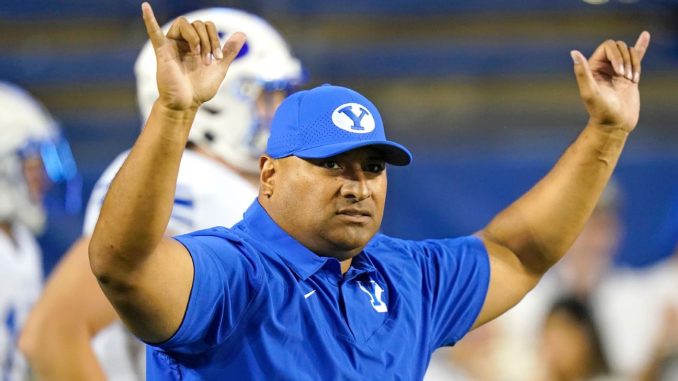
longtime leader. Kalani Sitake has been a transformative figure for BYU football since he took the reins of the program in 2016. Under his guidance, the Cougars not only returned to national prominence but also developed a strong, competitive culture that resonated with players and fans alike. The announcement of his departure has sent shockwaves through the community, leaving many questioning what the future holds for the program.
Sitake’s decision to leave BYU for a more lucrative offer comes as a surprise, particularly given his deep ties to the university and the local community. A former BYU player, he has often expressed his love for the school and its values, which further intensifies the emotional weight of his exit. The contract, which reportedly amounts to $6.3 million, reflects the increasing allure of college coaching in a landscape where financial incentives continue to escalate. This shift highlights the reality that even beloved figures in college sports can be drawn away by the lure of more significant financial resources and opportunities.

As fans and players attempt to grasp the implications of this sudden change, questions arise about the future direction of the football program. Who will take the helm as head coach? Will the new leader continue the ingrained culture of excellence and character that Sitake fostered? The uncertainty surrounding the coaching search adds another layer of complexity to the situation, as the university must ensure that it selects a candidate who not only has a proven track record of success but also understands and appreciates BYU’s unique culture.
In recent years, BYU football has experienced a renaissance under Sitake. The team consistently posted winning records, and standout seasons bolstered their reputation in the college football sphere. Significant victories against ranked opponents elevated the Cougars’ status and helped to reignite passion among fans and alumni. Sitake’s departure poses a risk to the momentum they’ve built, with concerns about recruiting, player retention, and overall program stability looming large.
Moreover, current players may find themselves facing an uncertain future, especially those who chose BYU to play for Sitake. Navigating emotional responses while contemplating the implications of a coaching change can be particularly challenging for student-athletes. Potential recruits, too, will be evaluating their options with Sitake’s exit in mind, as they consider the program’s future trajectory and leadership style.
As BYU moves forward, it must also reckon with the changing dynamics of college athletics. The landscape is continually evolving, with conference realignments, NIL (Name, Image, and Likeness) deals, and increased competition—all factors that BYU will need to maneuver through as it searches for Sitake’s replacement. Consistency amid these changes is vital, and the university must exercise due diligence to ensure that its next head coach can adapt to these demands while leading the Cougars to sustained success.
For now, the BYU community is left to process this abrupt change, reflecting on what Kalani Sitake has brought to the program while anticipating a new chapter that holds both promise and uncertainty. The journey ahead will undoubtedly shape the legacy of BYU football for years to come.

Leave a Reply